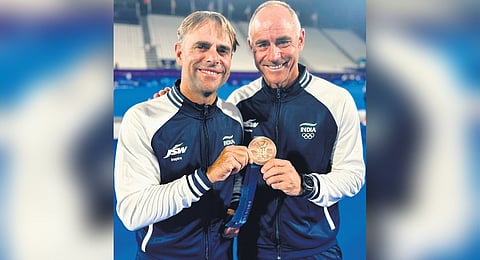

CHENNAI: There is perhaps a perception that Indians consider talking about their vulnerabilities as taboo. Even as athletes from elsewhere have taken mental health breaks, it’s something Indian sportspersons have not tended to do. However, Paddy Upton, who has been on and off with the men’s hockey team for the last year, reveals that Indian athletes are far more open when it comes to opening up and talking about their vulnerabilities.
In the first part of a two-part interview to this daily, the South African, who was with the men’s cricket team when they won the World Cup in 2011, speaks about the differences and similarities between both teams, getting Indian athletes to open up and why South African minds have had a lot of success in training Indian athletes to glory. Excerpts:
On the differences and similarities between the two teams
One of the differences was when I joined the cricket team, players had respect for Gary Kirsten because of his cricket credentials. It took time for players to gain that trust in me and my approach. As with any team, some players trust very quickly. For example, Virender Sehwag opened up very early, he was the first player to do so. He said ‘I will trust you straight away but if you do one thing to break my trust, then it’s over’. Other players took a lot longer. The difference when I joined the hockey team is I came with a certain credibility that I had worked with the cricket team and having had players like (Sachin) Tendulkar, (Rahul) Dravid and (Virat) Kohli endorsing my work. Players were quite open and receptive from very early on. Then again, there were some who were more receptive than others at first.
Within the Indian context, there may still be a perception of there being a stigma when it comes to opening up and freely sharing their vulnerabilities...
I think it’s less and less of a stigma now than what was there previously about opening up and talking about their vulnerabilities. My experiences with India compared to other nations are people are a little bit more open. They share more honestly and also share their vulnerabilities. By the same token, my approach is ‘I know if I push players too fast to open too quickly, I’m actually going to close them down’. My approach is a very allowing approach. If someone wants to talk to me, I make myself available. If someone doesn’t want to talk to me, that’s 100% okay, so nobody gets pushed.
However, with the hockey team because I know that players are slower to open up, a lot of my work in the beginning, say, four months was mostly group work.
On what it entailed
What I did is I got individuals to write their own reflections for themselves so they looked at their vulnerabilities, their difficulties, their negative thinking... I told them it’s for you to look and reflect and I’m not going to ask you to share. In a way, people are opening up in a team environment and they are opening up to themselves. I also do some exercises where I ask players to talk to somebody who they know very well. In the hockey world, which is very different from the cricket world, players share rooms. The roommates know each other much better in the hockey world... I ask people to pair up with their roommates and have slightly more deeper conversations. So I don’t need people to be talking to me. I just need people to be opening up.
On the success of South African minds (Craig Fulton, Kirsten, Wayne Lombard, Upton himself, Morne Morkel, Jonty Rhodes and so on) within the Indian sporting ecosystem and whether it’s by chance or design
There is always an advantage of having a foreign coach because they bring different experiences, fresh eyes and new perspectives so there’s value. It’s important for there to be some Indian leadership and support staff as well. A great example would be Rahul Dravid winning the World Cup with only Indian support staff. One of the reasons why South Africans do better for example... why there aren’t many Australians when Australians are actually, they do better than South Africa in most sports.
They (Aussies) are a lot more organised, there’s a lot more money but South Africans, we have... we really understand diversity, having gone through democratization post Apartheid. We really understand what it means to work with people with different cultures, backgrounds, different perspectives. We have gone through so much difficulty, so many struggles, the change in governments, rampant corruption, load shedding... so our natural inclination is to be able to accept whatever the situation is and problem solve without moaning, without complaining, it doesn’t help to moan or complain. We are naturally conditioned to accept whatever the situation is, listen and come up with solutions. Two of the main reasons.
In part two, to be published on Sunday, Upton spoke about how the hockey players cheated death and how that gave the team a perspective on pressure.